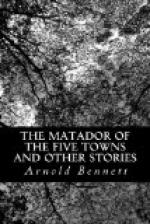Stirling was quiet. He appeared to be absorbed in steering, and looked straight in front, yawning now and again. He was much more fatigued than I was. Indeed, I had slept pretty well. He said, as we swerved into Trafalgar Road and overtook the aristocracy on its way to chapel and church:
“Well, ye let yeself in for a night, young man! No mistake!”
He smiled, and I smiled.
“What’s going to occur up there?” I asked, indicating Toft End.
“What do you mean?”
“A man like that—left with two babies!”
“Oh!” he said. “They’ll manage that all right. His sister’s a widow. She’ll go and live with him. She’s as fond of those infants already as if they were her own.”
We drew up at his double gates.
“Be sure ye explain to Brindley,” he said, as I left him, “that it isn’t my fault ye’ve had a night out of bed. It was your own doing. I’m going to get a bit of sleep now. See you this evening, Bob’s asked me to supper.”
A servant was sweeping Bob Brindley’s porch and the front door was open. I went in. The sound of the piano guided me to the drawing-room. Brindley, the morning cigarette between his lips, was playing one of Maurice Ravel’s “L’heure espagnole.” He held his head back so as to keep the smoke out of his eyes. His children in their blue jerseys were building bricks on the carpet.
Without ceasing to play he addressed me calmly:
“You’re a nice chap! Where the devil have you been?”
And one of the little boys, glancing up, said, with roguish, imitative innocence, in his high, shrill voice:
“Where the del you been?”
MIMI
I
On a Saturday afternoon in late October Edward Coe, a satisfactory average successful man of thirty-five, was walking slowly along the King’s Road, Brighton. A native and inhabitant of the Five Towns in the Midlands, he had the brusque and energetic mien of the Midlands. It could be seen that he was a stranger to the south; and, in fact, he was now viewing for the first time the vast and glittering spectacle of the southern pleasure city in the unique glory of her autumn season. A spectacle to enliven any man by its mere splendour! And yet Edward Coe was gloomy. One reason for his gloom was that he had just left a bicycle, with a deflated back tyre, to be repaired at a shop in Preston Street. Not perhaps an adequate reason for gloom!... Well, that depends. He had been informed by the blue-clad repairer, after due inspection, that the trouble was not a common puncture, but a malady of the valve mysterious.




